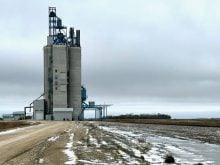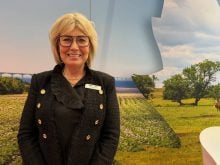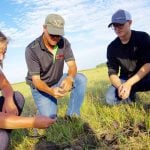EDMONTON Ñ Manitoba hog producers, frustrated by not getting full insurance coverage at a reasonable cost, plan to establish their own insurance company.
Brad Friesen, one of the Manitoba hog producers on the committee to form a specialized insurance company, said few companies are prepared to take on the risk of insuring a
multimillion-dollar hog barn at full replacement coverage.
“They’re not willing to take on hog barns any longer,” said Friesen. “We know of people who could not get insurance on operations because of a previous loss.”
Read Also

Internet of Things tapped for better emissions insights
Interconnected field sensor fleet allows better soil monitoring coverage and, hopefully, live insights on farm greenhouse gas emissions and nitrogen fertilizer application for farms.
The Altona, Man., farmer sat on a Manitoba Pork Council committee in 2004 to look at the feasibility of forming an insurance reciprocal, which is a company owned by producers that provides insurance just for hog barns.
Many producers can only get $1 million coverage on a $6 million hog barn and have seen premiums rise dramatically, partly because of events driven outside the hog industry, including terrorist attacks on the World Trade Centre on Sept. 11, 2001.
Under an insurance reciprocal, producers would own and direct the company. A similar arrangement was set up by custom aerial applicators after they couldn’t get insurance for their business.
There are about 1,500 active pork producers in Manitoba and the company would need about 75 to operate. Friesen said they’ve had the most interest from large barn owners, but are hoping for a cross section of producers.
“Over the years producers will migrate to it because of the lower premiums,” he said.
The group is using a Vancouver insurance underwriter to work out details of insuring the barns, the hogs and providing business interruption insurance.
They hope to have the insurance reciprocal operating by the spring of 2006.
Canadian Farm Insurance Corp. of Alberta is another example of a company specially designed to insure hog barns.
Bill Grieve, the company’s chief agent, said the company was established because of a lack of coverage and high premiums for large hog barns.
“In the last several years it became fairly serious for these pig farmers,” Grieve said.
“The insurance companies say, ‘we don’t like those risks.’ So consequently the big insurance companies either cut back capacity and will not insure pig barns or insure to a limit,” said Grieve, who has worked for several years to bring the U.S. company, Great American Insurance Co., to Canada to provide specialty hog insurance. It can provide up to $30 million coverage at every hog site.
“I found that astounding,” he said. “There are very few choices out there. We’re just one more choice coming on stream.”
Grieve insured his first Canadian hog barn in May.
Canadian Farm Insurance Corp. is an offshoot of Nilsson Brother’s Canadian Farm Insurance Services, which was the largest livestock insurance company in Canada,
Nilsson Brothers was owned by Brian and Lee Nilsson and Grieve, the company’s former chief financial officer. The share structure is changing. Grieve will become the sole owner of the insurance part of the business and will no longer have shares in Nilsson Brothers.
“This is not a divorce, but reflecting the shares to where the focus is,” he said.
In the first year Grieve expects to have $10-$15 million worth of insurance premiums from the confinement barn business alone. In the future he hopes to sell liability protection to registered seed growers against varietal mixup and other problems.
“There’s lots of seed growers and there is a risk out there,” said Grieve, noting the industry will not insure canola.
James Hofer, hog manager for the Starlite Colony at Starbuck, Man., said difficulty getting insurance for colony barns was the reason the Hutterites established their own insurance company more than 15 years ago.
“At that time there was a high rate of fires at the colonies,” said Hofer. Hog, chicken and dairy barns were all a concern.
Now there are about 40 colonies in Manitoba, South Dakota, Minnesota and North Dakota that get coverage through the colony insurance system.
Under the new program, the colonies were required to upgrade fire alarm and smoke detection systems to reduce the risk of fire.
“The last number of years have been very good,” said Hofer of the reduced number of fires in colony barns.
He also said it was important to have someone operating the company who understands how Hutterite colonies operate.
Paul Hodgman with Alberta Pork said his group is watching Manitoba’s insurance system to see if there is a fit in Alberta for a similar program in the future.














